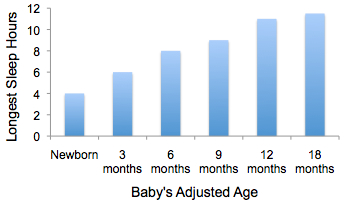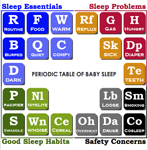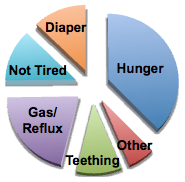 Getting your baby to sleep through the night is a huge victory for parents. For most of us, it doesn’t come easy. It comes after weeks upon weeks of establishing sleep routines, figuring out your baby’s wants and needs, and trying lots of different strategies. You can and will get there. Here’s how to get started.
Getting your baby to sleep through the night is a huge victory for parents. For most of us, it doesn’t come easy. It comes after weeks upon weeks of establishing sleep routines, figuring out your baby’s wants and needs, and trying lots of different strategies. You can and will get there. Here’s how to get started.
Table of Contents:
When do babies sleep through the night?
What does “through the night” mean?
Strategies to Get Through The Night
Setting a nightly routine
Feeding your baby at night
Dressing your baby for sleep
Setting the stage: Your baby’s room
Problems and Troubleshooting
Be prepared for any problem
When your baby wakes up at night
3 last tips for getting baby to sleep longer
When do babies sleep through the night?
It varies quite a bit between babies, but almost never before two months of age. Newborns have to eat every 4 hours or so, so even if they could go all night, they probably shouldn’t. Sorry, that’s part of having a baby! You’ll probably turn a corner at 3-4 months, when babies can sleep five hours or longer after a good feeding. See the baby sleep chart for more. Food is, in my opinion, the ultimate determinant of when babies start sleeping through the night. As soon as your baby can take, and hold, enough food to last for a long stretch, you can start working toward sleeping through the night.
What “through the night” means
You, as an adult, probably like to get 7-8 hours of good, uninterrupted sleep each night. When the baby comes, you’re lucky if you get 3 or 4 hours at a time. On the bright side, newborns sleep about 18 hours throughout the day, so when they sleep, you sleep to make up for those late nights. You should set milestones, based on your baby’s adjusted age, for the longest period of nighttime sleep:
By twelve months, your baby should be able to sleep 10-11 hours through the night without waking. Here’s what you’ll need to get there.
Setting A Nightly Routine
Choosing a nightly routine for your baby is critical to help him sleep through the night. The bath-bottle-bed routine is a classic example. Performing the same steps with your baby, in the same order, helps train them that it’s time for “the big sleep” at night. It also helps you remember to do everything that matters – change the diaper, put on the pajamas, swaddle, etc.
| Dinner Solid foods mixed with cereal, as much as the baby will take. |
Play Time Bouncer, play yard, bumbo chair, and/or tummy time (not right after eating, though) |
Bath As often as possible. This really relaxes them. |
Bottle As much as your baby will take, followed by a good burping. |
Bed Clean diaper, warm pajamas, full belly, swaddler, sound machine. |
 |
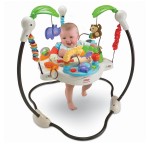 |
 |
 |
 |
Even the best parents can forget a step; we’re all working on limited sleep, right? For a detailed guide on what your baby’s nightly routine should look like, see Establishing a Bedtime Routine.
Feeding Your Baby At Night

- Save the formula for nighttime. If you supplement with infant formula, which is common, you may wish to do so in the evening or at night. I am not suggesting that you feed with formula instead of breast milk. We all know and appreciate the benefits of breast feeding. However: a lot of moms supplement breast milk with formula, either out of convenience or necessity. For these moms, I suggest favoring breast milk during the day (as it digests more quickly) and favoring formula at night. Or, offering a little bit of formula once the milk is exhausted at nighttime feedings. The goal is just to make sure that your baby has a full belly, which gives him or her a better chance at sleeping through the night.
- Solid food at dinner. As soon as your baby is allowed solid food, start offering it to him. You’ll probably be instructed to try single-grain cereal before baby food. It takes a while for babies to get the knack of it, but your efforts will pay off. Solid food makes a HUGE difference in keeping your baby satisfied. When your baby starts eating a container with a bit of cereal mixed in at dinner, you’ll see a big difference in nighttime sleep. See our article on 6 Tips for Starting Solid Food.
- Thicken food with cereal. The single-grain cereal is a great thickener, and it helps your baby stay full for longer. You can mix it into runny baby foods, especially carrots, sweet potatoes, and most fruits, to make them more substantial. They also stick to the spoon better and make feeding less messy. Baby cereal is very nutritious, so don’t feel like you’re short-changing the baby’s diet.
About cereal in the bottle
As a rule, many pediatricians and nutritionists advise against adding cereal to bottles. They have convincing reasons for this. Realistically, this is a rule that is “broken” by many parents whose babies wake up hungry in the middle of the night. Whether or not you should try this is is up to you.
I am neither advocating it nor speaking out against it, but a little bit of cereal into the last bottle of the night can help a baby sleep longer. Not more than a teaspoon or two; it should still be liquid after you mix it. Be sure to use a level 2 or level 3 nipple and watch for clogs. This should not be the only way that your baby gets cereal. You still have to do the work of teaching him or her to eat with a spoon.
Whatever you use, make certain that you offer your baby all that he’ll take at the nighttime feeding. If he finishes a bottle and seems interested, offer another 2 ounces. Make sure to burp regularly, of course. The more you can get your baby to take, the longer he’ll be able to go without waking up.
For more help, see Nighttime Feeding and Sleep.
Dressing Your Baby to Sleep At Night
Ensuring that your baby is warm, safe, and secure will help him get a good night’s sleep. He or she may not tolerate a baby hat or mittens, but here are some other, more essential things.
- A fresh diaper.
 Even if you changed it half an hour ago, put on a fresh one. Every bit of dryness counts. As soon as your baby’s big enough for a size 3-5 diaper, look into Huggies Overnites, which are extra absorbent and designed specifically to wick away moisture overnight. These things are lifesavers!
Even if you changed it half an hour ago, put on a fresh one. Every bit of dryness counts. As soon as your baby’s big enough for a size 3-5 diaper, look into Huggies Overnites, which are extra absorbent and designed specifically to wick away moisture overnight. These things are lifesavers! - Clean, soft pajamas. I prefer long-sleeve pajamas with footies. A little over-sized is okay, but never put a baby in pajamas that are too tight. Soft pajamas are not only more comfortable, but they’re a tactile clue that your baby will associate with sleeping at night. See our review of cute baby pajamas.
- Good swaddling. A well-executed swaddle will keep your baby warm and snug, but also acts as a safety measure because it prevents him from getting a limb caught in the crib. Such incidents aren’t usually life-threatening but they tend to evoke a screaming fit, so prevention is key. Learn how to swaddle a newborn and do it every night. If your baby kicks out of it, check out our review of sleep sacks and sleeping bags.
Setting the Stage: Your Baby’s Room
There are lots of things you can do in the baby’s room to make it a safe, comfortable environment that encourages long hours of sleep. You want to make your baby’s room and crib a place where he feels cozy and secure, a place where he knows it’s time to sleep.
This is why you shouldn’t play with your baby while he’s in his crib, no matter how cute he’s being. The crib is for sleep only. Here are some other tips that I’ve found useful in extending a baby’s ability to sleep through the night, most of which are also highlighted on the periodic table of baby sleep.
- Consistent darkness. Unless you enjoy waking up at sunrise, invest in some good room-darkening shades for your baby’s window. Also, install a small lamp or baby night light, somewhere near the changer and away from the crib, to help you see while not over-stimulating the baby into wakefulness. See our review of baby night lights for some suggestions.
- Quiet or white noise. When the baby goes to bed, try to keep the noise to a minimum. This probably isn’t possible if you have other children. We set up a small fan in the baby’s room by the door and turn it on when he goes to bed. This provides a nice, consistent white noise and has the added benefit of moving some air around in the room, keeping the temperature more consistent.
- A wind-up or electric music box is an exception to the “quiet” rule: soft music can have a soothing effect at bedtime. You might try a soother or sound machine and see how it goes; some babies like them, some babies hate them. Make sure you have something that either winds up or has a shut-off timer, so you don’t have to go back in to turn it off. With luck, the music from it will be another cue that it’s time to go to bed and sleep through the night.
- For safety reasons, your newborn’s bed should be clear of anything that could pose a hazard, including baby clothes, blankets, stuffed animals, pillows, and crib bumpers. Yes, crib bumpers. I know they’re cute, but they have been linked to infant injuries and deaths. I don’t know why they even make these any more.
- If your baby has reflux or wakes up due to gas, you can try slightly elevating the head of your baby’s bed. Often this can be accomplished using the crib’s height settings, and lowering the “foot” of the bed one peg to create a slight incline. This puts gravity on your side and reduces spit-ups. You can also go the low-tech route and put a phone book under one side.
Be Prepared for Any Problem
Almost every problem that prevents your baby from sleeping through the night has a fix, and you should keep that solution close at hand. Before you put your baby to bed for the night, think about the common reasons babies wake up or won’t sleep and get everything prepared:
- Have clean diapers out where you can reach them. Whether or not to change the diaper is a judgment call, since you risk waking the baby up even more, but if it’s soaked or dirty, you should do it. Have the new diapers unfolded with tabs at the ready.
- Make sure the wipe warmer is stocked. I’m a big proponent of baby wipe warmers; not only do warm wipes help avoid stimulating the baby, they seem to reduce the number of times the baby pees on you.
- Keep extra pacifiers in the bed and on tables in your room or the baby’s room. You can never have too many pacifiers, and they’re often hard to find at night. See our review of the best pacifiers.
- Set out bottles with pre-measured formula, nipples, and a burp cloth. When they wake up hungry, babies want food NOW. Save time and minimize fumbling by having this stuff ready to go.
- Make sure the rocking chair is clear so that you have a soft and safe place to take your baby for feeding or soothing.
With this arsenal to handle any problem, and the strategies outlined above, you’ll have your baby sleeping through the night better than ever before. Good luck!
When Your Baby Wakes Up At Night
No matter how perfect your preparation, there will still be the occasional wake-ups in the middle of the night. How to handle these is an area of contentious debate among sleep experts. In my own case, I don’t have the option of letting a baby fuss for long, because our twins share a room and are close to their 2-year-old sister.
Wake-ups are common, even among babies that routinely sleep through the night. You might not be doing anything wrong! To the left you’ll see a pie chart from my article on Why Baby Won’t Sleep depicting the most common reasons that babies have trouble sleeping. There are several possible causes, but when your baby wakes up, here are some response strategies that you should keep in mind:
- Respond quickly, but quietly. Don’t go barging in and throw on all the lights. Don’t say anything. The less you stimulate your baby, the better.
- Try soothing him in his bed first. Resist the urge to pick him up. At least half of the time, I can get a baby back to sleep by re-inserting the pacifier, tucking his blanket in, and shushing him with a soft voice. I’ve also had luck pushing down on the crib mattress (gently) near the baby to offer a little bit of vibration, almost like taking baby on a car ride.
- Find the problem, and fix it. If it’s clear that your baby is hungry, and you’re both up anyway, you might as well feed him. If he looks uncomfortable or squirmy, try burping him. If she looks frightened, hold her close and rock her.
- Leave the room as soon as the baby is settled. Don’t stick around to see if it worked, just leave the room and listen outside the door. That way, your baby won’t see you and think it’s time to be extra-cute and wake up.
For more help, see the in-depth article on How to Soothe Your Baby Back to Sleep.
Three Things to Try to Get Baby to Sleep Longer
If you’ve followed my advice so far, you’re a long way on the road to having your baby sleep through the night. There are three “sleep extending” strategies I haven’t touched on that might help your baby sleep longer and more consistently.
1. Bath before bed
Babies seem to respond differently to baths – some love them, some hate them. I think that water temperature is key here. It should feel slightly warm to your touch, about 90 to 95 degrees. A baby bath thermometer helps. Splash some warm water on the seat or platform that holds your baby up right before he or she goes in – if these get wet and are exposed to air for a couple of minutes, they turn cold very quickly. Regardless of how much they enjoy the bath itself, 100% of my babies are more relaxed after a bath. They fall asleep easier and usually sleep for longer.
2. Early bed time
This is a strategy that you often hear about from sleep experts – the early bedtime. A lot of parents put their babies to bed for the night too late. It seems counter-intuitive, but often putting babies to bed earlier helps them sleep longer. For us, the right time was around 1-2 hours after dinner, around 8:00 or 8:30. Experiment with this and find the right time for your baby.
3. Hands free to soothe
This is for older babies, ones that are using their hands to grab and hold things. Try giving your baby a light-weight blanket, blankie, or extra-soft plush animal to hold at bedtime. Again, not for newborns. Technically, this is not in line with the current sleep safety guidelines so consider it carefully. If you decide to try it, experiment with a few different items. Our boys like the corner of a thin receiving blanket, specifically the legendary Aden+Anais blankets. The soft touch against their cheek soothes them to sleep, and often back to sleep if they wake up.
What To Read Next
Our complete guide to teaching healthy baby sleep habits is called Baby Sleep Training 101. If you like this article, you might want to subscribe by e-mail or RSS so that you’re notified when new content is posted.
 |
 |
 |
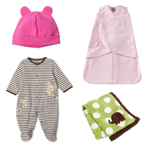 |
| Baby sleep problems takes you through the most common sleep issues and how to address them. | Our video monitor reviews compare the latest cutting-edge wireless color video baby monitors. | Visit our sleep training section for strategies and tips for teaching your baby to sleep through the night. | Check out our reviews of Essential baby gear for helping babies sleep at night. |
